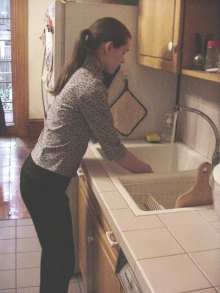 |  |  |  |  |  |  |
 |  |  |  |
Body Mechanics | Neck Issues | Sleeping | Relieving Stress at Home
Ergo Home
| Ergonomics, the science of fitting the job to the person, should be something that people practice at home in their daily life, not just during the workday. Lower Back Pain and Carpal Tunnel Syndrome can occur at home from activities such as improperly lifting heavy objects, chopping vegetables or sewing just as easily as they can occur at the office. Here are some suggestions for practicing ergonomics easily at home. | |
|
Proper Body Mechanics and Articulation at Home
| |

| Bending: Whether you are gardening, washing dishes, or raking leaves, it is easy to bend the spine incorrectly, which can result in Lower Back Pain, Cervical Disc Herniation, Lumber Disc Herniation, or Neck Pain. Bend forward from the hips, not the back, and keep your neck and head in line with your spine to prevent back problems.
Lifting: Lift heavy objects from the legs, not the back. This usually requires squatting down to lift the object. If something is too heavy for you, ask for help. |
|
Neck Issues
Our everyday posture affects our health and well being just as much as our work posture does. Often people don't worry about their posture when they leave their computers at work and slip into slouching, slumping Forward Head Posture while reading, watching television, eating, or using a home computer, leaving them vulnerable to Neck Pain and other RSIs.
| |
 | Reading: Lift your book to eye level instead of collapsing your neck to look at the book. Move your eyes more than your neck when reading. This will strengthen your eyes as well as reduce awkward neck movement that may lead to Neck Pain. Try supporting your elbows with a pillow on your lap in order to have the book comfortably at eye level. |
Sleeping Getting enough sleep is essential to good health and the prevention of RSIs. When your body is tired your immune system is overburdened and less able to cope with the buildup of irritating waste products in your muscles. Stress buildup increases anxiety and makes getting enough sleep harder, which can turn into a vicious cycle of little sleep=tiredness=stress=little sleep, and so on. Often sleeping in awkward positions puts additional strain on joints instead of being the healing, restful activity that sleep is supposed to be. If you sleep on your back, place a pillow under your knees to support your legs. If you sleep on your stomach, place a pillow under your stomach to support your lower back. If you sleep on your side, place a pillow between your knees to support your back, and one between your arms as well. Don't use too many pillows or overstuffed pillows, since this pushes the neck too far forward into Forward Head Position. Instead, use a pillow that forms to the curves of your neck and head, such as a down pillow or a buckwheat pillow. | |
|
Relieving Stress at Home Today's world is increasingly complex. As the world gets smaller through new technology and increased connections through this technology, the amount of devices that we use daily keeps growing. Cell phones, palm pilots, faxes, email, instant messenger, laptops, and technology that is beginning to link all of these together crowd our days, piling on top of all our other responsibilities and creating stress that seems to never end. The boundaries that used to exist between work and home are now beginning to blur. People work longer hours, with shorter breaks, and often do additional work at home in the evenings or on weekends. Many people work at home, which eliminates the boundaries between work and home altogether. Whether you work at home or in an office, most people experience some kind of work-related stress during their careers. Recent studies have shown that long term, chronic stress, the kind often associated with the stress of the workplace, have an adverse effect on our health. Aging faster, susceptibility to certain diseases, memory problems, and heart problems can often be attributed to long term, chronic stress, not to mention a higher rate of RSIs. People who work long, uninterrupted hours in demanding, stressful conditions or at computer-related or sedentary occupations are especially at risk for higher stress levels and health problems including RSIs. Proper rest, a healthy diet and regular periods of relaxation can serve as antidotes to today's stressful world, as well as help contribute to a happier, healthier life. Here are some suggestions for relieving stress. Get enough sleep. Rest is essential to good health and stress relief. Take periodic breaks, both during the day and longer ones (vacations). When you do take a vacation, let it truly be relaxing. Leave behind your cell phone. Exercise daily. Whether you workout at the gym, take a yoga or dance class, or simply take a stroll around the block, daily exercise will contribute to health and well being. Practice conscious relaxation. Yoga, meditation or good, old fashioned spacing-out are all good ways to relax and clear out the mind. Cultivate interests that aren't related to your work. Paint, read, travel, collect cigars, play with your children, cook, go to the movies, whatever. Doing things that you enjoy contributes to your health and well being and reduces the risks of certain illnesses and RSIs. | |

